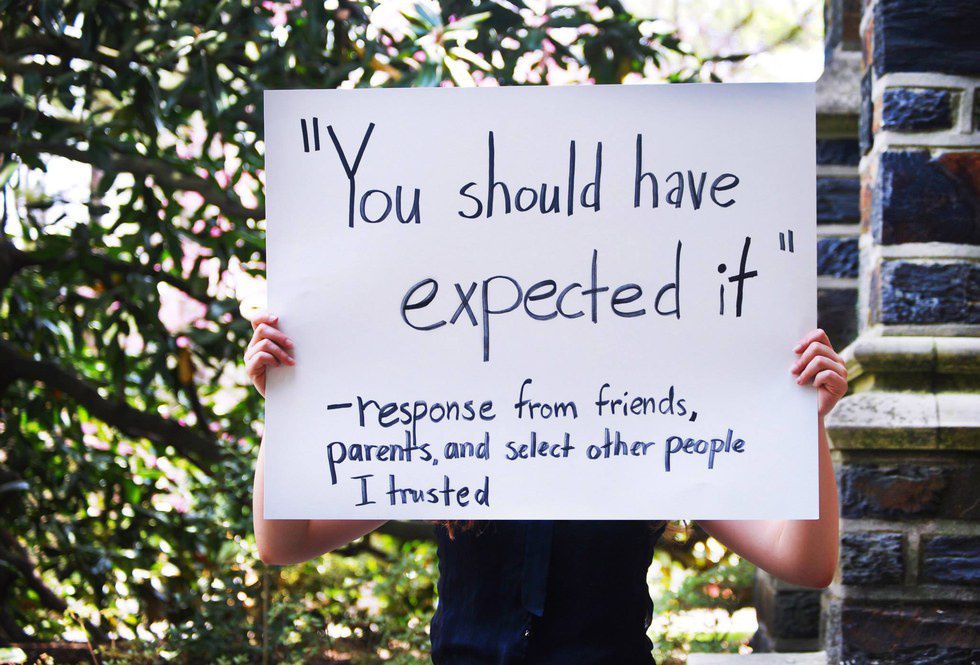When college students think of April, what usually comes to mind is cramming for exams, leaving for summer, and “April showers bring May flowers.” But April is also Sexual Assault Awareness Month (SAAM). I want to start this article off by saving I have never been a victim of sexual assault. I will never pretend that I can relate to the experiences of others. However, I have friends very close to me who have been victims. Sexual assault, specifically on college campuses, is an epidemic that affects all of us.
According to the Department of Justice, sexual assault is “any type of sexual contact or behavior that occurs without the explicit consent of the recipient. Falling under the definition of sexual assault are sexual activities such as forced sexual intercourse, forcible sodomy, child molestation, incest, fondling, and attempted rape.”
Recommended for you
College campuses are supposed to be a safe zone, a bubble that protects you until you graduate and enter into the real world. But the statistics are alarming:
· 1 out of every 4 college students will be the victim of a rape or attempted sexual assault
· 88% of women who are sexually assaulted on campus do not report
· 90% of victims of sexual assault on campus know their attacker
· 26% of rapes reported to the police lead to an arrest
· Only 3% of rapists will even see a courtroom
One of the major stereotypes is that sexual assault only affects women, which is not the case at all. Masculinity is an image men are supposed to upkeep- they are not supposed to seem vulnerable or weak. It is estimated that 1 in 16 college men have experienced sexual assault. The issue of unreported cases is high with males, due to fears of being mocked, not believed, or feeling like “less of a man.”
On the other hand, men are not told to never leave their cup unattended at a party. Men are not told to carry pepper spray. Men are not told to never walk alone at night. These are pieces of advice that college women such as myself have grown up hearing.
 Victim blaming is one of the most disgusting concepts in our society today. The fact that police officers often ask victims what they were wearing, how much they had to drink, and who they were with should not deter from the fact that they were attacked. They were not asking for it. Society teaches us “don’t get raped” instead of “don’t rape.” It is never the victim’s fault
Victim blaming is one of the most disgusting concepts in our society today. The fact that police officers often ask victims what they were wearing, how much they had to drink, and who they were with should not deter from the fact that they were attacked. They were not asking for it. Society teaches us “don’t get raped” instead of “don’t rape.” It is never the victim’s faultThe aftermath can be just as bad (or worse) than the attack itself. When we think of PTSD, we immediately think of soldiers, men and women of combat. However, the National Women's Study reported that almost one of every three all rape victims develop PTSD sometime during their lives. Survivors of sexual assault can experience depression, suicidal thoughts, nightmares, irritability, and the feeling of always being on edge.
“The Hunting Ground” on Netflix is one of the most moving, informative, and terrifying documentaries that I have ever seen. The film is about sexual assaults on college campuses and it includes first-person testimonies of their experiences and the stigma associated with it. It also talks about how several institutions are attempting to cover up the incidents in order to protect the "brand" and reputation they are selling to prospective students. The survivors are pursing justice despite incredible pushback and harassment.
 The documentary mentions the case of Jameis Winston, legendary Florida State University quarterback, who allegedly raped student Erica Kinsman, along with two other students on separate occasions. In 2015, he was found not responsible for violating student code of conduct and was later selected as the first overall pick in the NFL draft. It mentions the case of Emma Sulkowicz from Columbia University, who vowed to carry her mattress on her back around campus for as long as her rapist attended the same school. She ended up carrying it with her at graduation.
The documentary mentions the case of Jameis Winston, legendary Florida State University quarterback, who allegedly raped student Erica Kinsman, along with two other students on separate occasions. In 2015, he was found not responsible for violating student code of conduct and was later selected as the first overall pick in the NFL draft. It mentions the case of Emma Sulkowicz from Columbia University, who vowed to carry her mattress on her back around campus for as long as her rapist attended the same school. She ended up carrying it with her at graduation.Duke University has been hosting a campaign titled “Duke Breaking Out” for the past few years. It gives survivors of sexual assault a space to tell their stories through quotes that their perpetrator, friend, or relative have said to them regarding their attack. I am proud to say that I am a part of the group that helped bring this campaign to Ashland University, titled "Ashland Breaking Out."
Sexual assault occurs on college campuses across the country. We cannot ignore it any longer. We can always teach students to be more safe or cautious, but the heart of the problem lies with the assailants. A rape occurs every two minutes. Don’t live in silence.

Resources:
“The Hunting Ground” on Netflix
Duke Breaking Out:https://www.facebook.com/dukebreakingout/photos
RAINN:https://www.rainn.org
See Act Stop:http://www.seeactstop.org



















